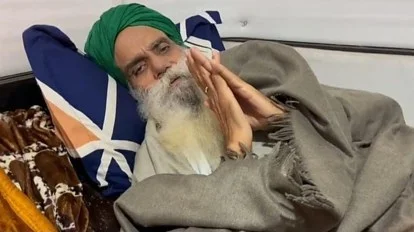The ongoing farmers' movement at the Punjab-Haryana border for the past year has taken a new turn. Jagjit Singh Dalewal, a prominent leader of the Samyukt Kisan Morcha, has vowed to go on a hunger strike until the government agrees to implement the Minimum Support Price (MSP) and address other key farmer demands. Despite suffering from a severe illness like cancer, Dalewal began his hunger strike on November 26. His firm stance has caused widespread unrest and anger among the farming community.
As news of Dalewal’s hunger strike spread across the country, farmers from Punjab and Haryana came together in large numbers. They supported his demands by calling for a Punjab Bandh on December 30. The bandh received overwhelming support, with farmers taking to the streets in various districts to intensify the movement. Concerns about Dalewal’s health have been rising since the strike began, with his family, fellow farmer leaders, and supporters worried about his condition. However, Dalewal has made it clear that he will not accept any medical treatment unless the government meets their demands.
Dalewal's primary demand is the legal guarantee of MSP. Additionally, he has demanded complete loan waivers for farmers, the implementation of a pension scheme for farmers and agricultural laborers, and the halt of electricity price hikes. These demands have garnered support from major farmer organizations in Punjab and Haryana. Organizations like the Samyukt Kisan Morcha, Bharatiya Kisan Union (Ekta Ugrahan), and All India Kisan Sabha have repeatedly submitted memorandums to both central and state governments. They have warned that the movement will intensify if the government does not take their demands seriously.
The Supreme Court has taken note of the situation, expressing concern over Dalewal's deteriorating health. The court has directed the Punjab government to provide immediate medical assistance to him. However, the Punjab government has neglected these orders. Expressing displeasure, the court instructed the state government to help Dalewal with care. Despite this, no medical assistance has been provided to him due to government inaction.
The Punjab government has written to the central government, requesting intervention in the matter. However, Union Agriculture Minister Shivraj Singh has stated that the case is pending in the Supreme Court, and the government will act based on the court's decision. The central government's stance has fueled discontent among farmers, who believe the government is deliberately ignoring their demands. Dalewal's ongoing hunger strike has further angered the farming community.
Dalewal’s supporters are deeply anxious about his health. His organization has urged him to end the hunger strike, but he remains firm in his stance, stating that he will end the strike only when the government agrees to the demands. Several farmer leaders have tried to persuade Dalewal to call off his strike, but he has refused to listen. His supporters have accused other farmer leaders of being government agents and attempting to weaken Dalewal's resolve.
In the wake of the Punjab Bandh, farmer organizations organized a Mahapanchayat at the Khanauri border. Thousands of farmers participated in the gathering. Addressing the Mahapanchayat, Dalewal urged farmers to remain united and intensify the struggle. He emphasized that although the government may use force, farmers will ultimately emerge victorious. His speech reignited determination among the farming community.
The government should make efforts to end Dalewal’s hunger strike. However, instead of taking concrete steps, it continues to offer assurances. The government should have implemented the court’s instructions and provided medical assistance to Dalewal promptly. The delay in admitting him to the hospital has raised serious questions. The government should have taken the farmers’ demands seriously and acted promptly. However, its inaction has caused widespread discontent among the farmers.
Farmers' demands have been longstanding. The legal guarantee of MSP remains their primary demand. In addition, they have called for pension schemes for farmers and agricultural laborers, loan waivers, and a halt to electricity price hikes. These demands need immediate resolution. However, the government has yet to take substantial measures, leading to increased frustration among farmers.
The farmers' movement is now taking a political turn. Several opposition parties have voiced their support for the farmers' demands and urged the central government to engage in meaningful dialogue with them. Yet, the government has not taken decisive steps. Instead, it continues to provide assurances without addressing the core issues faced by farmers.
The government must ensure Dalewal’s safety and well-being. Additionally, they must engage with farmer organizations to address their demands. Farmers are the backbone of the country’s economy, and resolving their issues should be a priority for the government. Frequent farmer protests are not beneficial for the nation. Therefore, the government must take farmers' demands seriously and provide the necessary relief.
If Dalewal’s hunger strike continues, it could have significant repercussions on the farming community and the country’s social environment. The government must follow the court’s directives, provide Dalewal with medical assistance, and address his demands. The government must deliver on crucial issues like loan waivers, pension schemes, curbing electricity price hikes, and legalizing MSP to restore peace and stability.
By fulfilling the farmers' demands, the government can ensure peace and stability in the country. Instead of merely offering assurances, it must take concrete steps. The government must act urgently to prevent any harm to Dalewal’s life. Failure to do so could have far-reaching consequences for the nation’s political, social, and economic landscape.
---
*Journalist


Comments